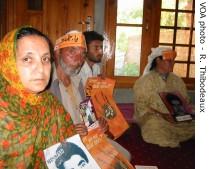2007年VOA标准英语-Kashmir's Mothers of the Disappeared Struggle t(在线收听)
Srinagar
03 July 2007
Thousands of young, military-age men in Kashmir have vanished during Kashmir's 18-year conflict. Estimates of the number missing range from 3,000 to as many as 10,000. But for one Kashmiri mother, one is too many. Raymond Thibodeaux reports from Srinagar, the capital of Indian-controlled Kashmir.
 |
| Parveena Ahangar, 47, (far left), in Srinagar |
As Parveena speaks, even the translator is moved to tears.
"She says when a mother raises her child, it is she who holds his hand when he is young," said the translator. "When she will be old it will be the son who will hold her hand. But in my case it was different, I could hold my son's hand when he was young, but he's not there when my hand needs to be held. She says, bring me back my children."
Parveena does not know why her son was arrested, or even whether he is alive. In her grief, she started a group called the Association of Parents of the Disappeared more than 10 years ago. Since then she has filled a thick green folder with hundreds of letters and sun-faded photographs from families with husbands and sons who have vanished.
Their story shows a darker side of Kashmir, a region that is famed for its scenic mountains, alpine lakes and Mughal gardens.
The region, which has a mostly Muslim population, is divided between Pakistani and Indian control, and both claim Kashmir entirely. For nearly two decades, Indian-controlled Kashmir has been racked by a separatist insurgency.
Many Kashmiris feel squeezed between two opposing forces: the 500,000-strong Indian security force and an untold number of armed separatists allegedly backed by Pakistani fighters.
At least 40,000 people have been killed in the conflict since it started in 1989. Since then, Kashmiris have become fed up with what they say is a litany of human rights abuses by Indian security forces, including extrajudicial killings, torture and rape.
But it is the fate of the missing that has led many Kashmiri activists to petition India's government for answers.
Mirwaiz Umar Farooq leads the All Parties Freedom Conference, an umbrella group of Kashmir's separatist leaders.
"We have written so many times to the United Nations. We have written so many times to Amnesty International, Asia Watch - so have the parents - even to the National Human Rights Commission in Delhi. But there has been no response," he said. "The fear is that the number of people missing is in the thousands. And the fear is that maybe most of them have been killed, whether killed by the army or whether killed in fake encounters, or whether they are missing."
He and other political leaders are calling for a truth and reconciliation commission similar to those in South Africa and Rwanda, to investigate human rights abuses and to solve the disappearances.
Colonel Sudhir Sakhuja, an Indian army spokesman, says the number of missing is far less than the 8,000 to 10,000 often quoted by international human rights groups. Still, he says the Indian army routinely investigates cases of missing Kashmiris.
"Even if one person is missing, the mother would feel bad for him. We are concerned about it. … It's unfortunate that some people are still reported missing - not necessarily because anything has been done to them by the Indian army or any of the security forces. Possibly they may have gone across the line of control and not got back, or gone into hiding because they had a background of militancy," said Colonel Sakhuja.
Peace talks between India and Pakistan have eased tensions between the two countries, and the fighting has eased in Kashmir. But the two governments have made little progress in permanently resolving the conflict, and there still are violent incidents between the Indian military and Kashmiris nearly every day.
For Parveena and thousands of other Kashmiris who have lost family members in this conflict, the political wrangling between India and Pakistan is irrelevant. For Parveena, there is only the one recurring question: Where is my son?